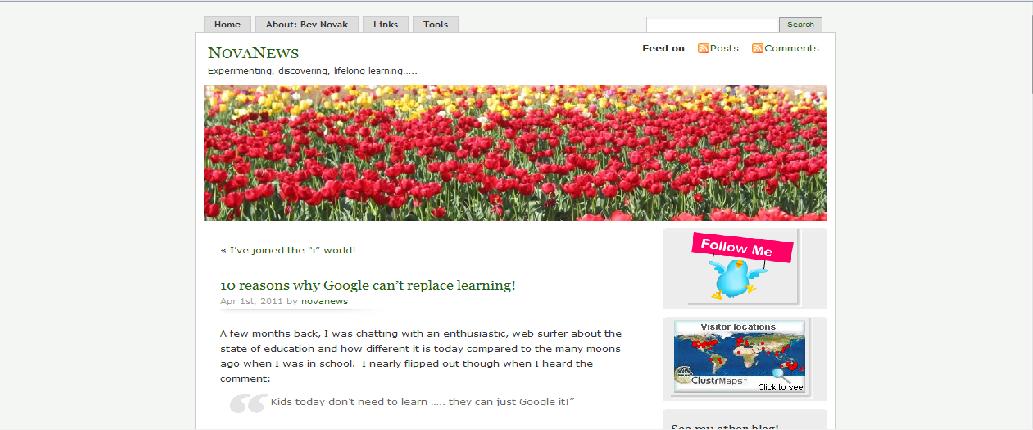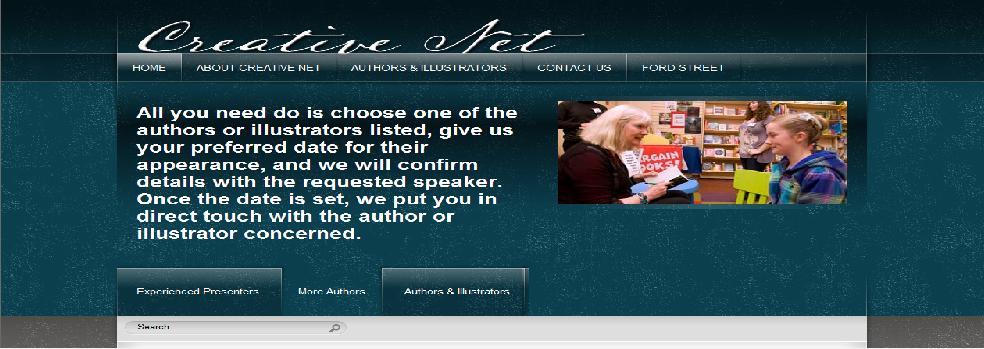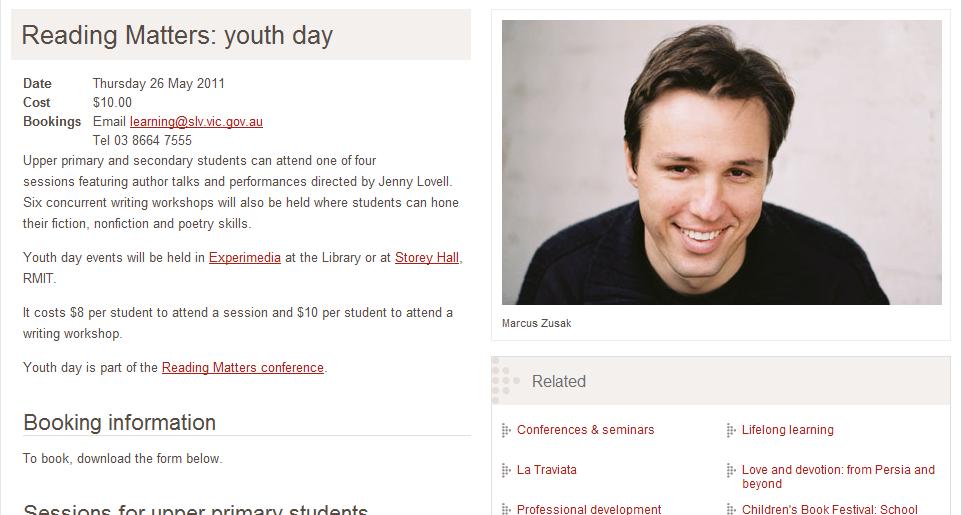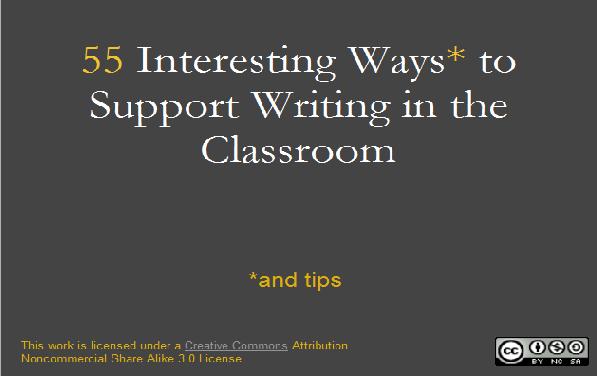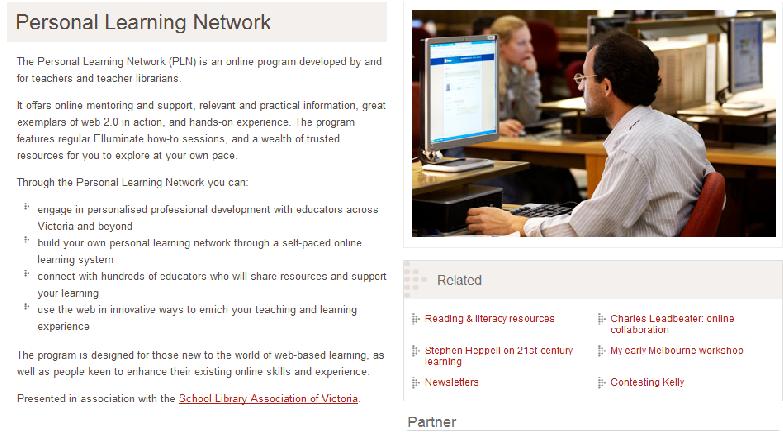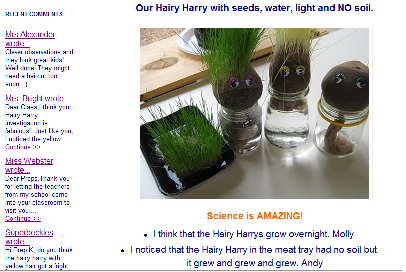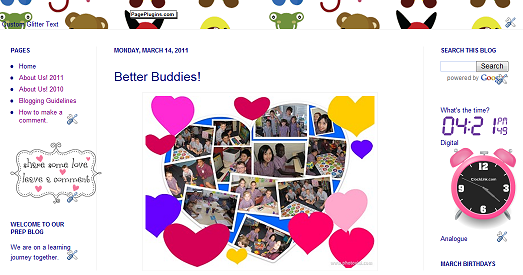 The Houston Chronicle Editorial recently published the article ‘Elegy for librarians: After all the budget cutting’s done, who’ll be around to help us ask the sharper questions’ (March 30th, 2011). While this article is a solid look at some of the roles of libraries and librarians in today’s society, what is powerful are the comments being left. Have a look and see what you think.
The Houston Chronicle Editorial recently published the article ‘Elegy for librarians: After all the budget cutting’s done, who’ll be around to help us ask the sharper questions’ (March 30th, 2011). While this article is a solid look at some of the roles of libraries and librarians in today’s society, what is powerful are the comments being left. Have a look and see what you think.
Author Archives: Rachel
Online Referencing Generator
Shaozhuo Wan, Carol Grantham and Silvana Jenkins from The School Library Association of South Australia (SLASA) have developed Online Referencing Generator.
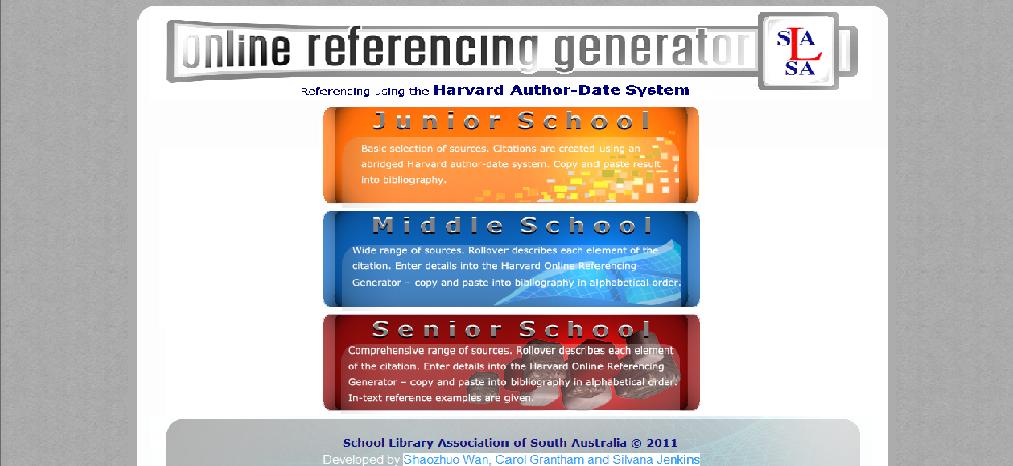
The generator uses the Harvard author-date system and supports junior school, middle school, and senior school. This resource would be a valuable asset for any teacher and student, and would be great to have as a resource available on a library website. If you want to add an Online Referencing Generator button to your site, go to SLASA’s website and follow the link.
Housekeeping
Worth reading: ’10 reasons why Google can’t replace learning!’ by Bev Novak
 Bev Novak’s recent post ’10 reasons why Google can’t replace learning!’ on her blog NovaNews is an impassioned reminder of the role of educators and the role of ICT tools in teaching and learning. As Novak explains, information is readily retrievable, but students still need their teachers and librarians to teach the life-long-learning skills required to turn that information into knowledge.
Bev Novak’s recent post ’10 reasons why Google can’t replace learning!’ on her blog NovaNews is an impassioned reminder of the role of educators and the role of ICT tools in teaching and learning. As Novak explains, information is readily retrievable, but students still need their teachers and librarians to teach the life-long-learning skills required to turn that information into knowledge.
Get your author on Creative Net
Creative Net facilitates author and illustrator participation at schools without you having to pay a speakers’ agency fee. There are plenty of speakers to choose from ranging from picture book authors and illustrators to young adult fiction authors and illustrators. You choose from an impressive list of speakers, and Creative Net confirms your date with the speaker and then puts you in direct contact with them. A great way to celebrate Book Week (August 20th – 26th).
School groups at ‘Reading Matters: Youth Day’
There is an amazing opportunity for school groups to hear and learn from a range of authors about their stories and growth as writers at Reading Matters: Youth Day, on Thurday 26th May. Youth day is part of the Reading Matters conference (Friday 27th May and Saturday 28th May) (see blog post ‘ALERT – Reading Matters conference’, published February 10th 2011, for more details).
Upper primary school and secondary school students can attend half-day sessions of presentations from four authors and an accompanying performance.
Upper primary school students and teachers, you can be wowed by; Newbery Medal winner Rebecca Stead (When You Reach Me), inaugural Text Prize winner Richard Newsome (The Billionaire Trilogy), graphic artist Brenton McKenna, and Oliver Phommanvanh (9.20am-11.30am and 12.35am-2.50pm).
Secondary school students and teachers, your session will feature; Markus Zusak (The Book Thief), Jane Burke (The Story of Tom Brennan), Karen Healey (The Guardian of the Dead), and Ursula Dubosarksy (The Golden Day) (9.20am-11.30am).
The cost is $8 per student (teachers are free).
There is also a Middle School Writing / Poetry Workshop with Lorraine Marwood (Prime Minister’s Literary Award winner, Star Jumps). In a one hour writing session Marwood will share her wisdom with students and challenge them to tap into their creativity (10.30am and 12.45pm). This will cost $10 per student.
This is a wonderful opportunity for students and teachers alike. For booking information and more details, visit the SLV page below:
’55 interesting ways to support writing in the classroom’
55 interesting ways to support writing in the classroom (and counting) is a compilation created by Tom Barrett, that can be contributed to by whomever. It is a ‘this is brilliant’ Google Doc resource that is flying around Twitter and is being contributed to through crowdsourcing. It is part of Barrett’s ‘Interesting Ways’ series and is definately worth a long look. Literacy is cross-curricular, so remember to share this resource with all.
ALERT – PLN program details
 The fabulous Personal Learning Network (PLN) program begins 9th May 2011!
The fabulous Personal Learning Network (PLN) program begins 9th May 2011!
The PLN is a brilliant online program offered by SLV in partnership with SLAV, developed by and for teachers and teacher librarians. The program offered can transform your teaching, giving you the skills to build a network of like-minded educators to share resources and learning with, to manage online content, and will provide you with opportunities to learn and use web 2.0 tools that have the potential to enhance teaching and learning. In a supportive environment you can work your way through a 12-unit mentored program.
You can participate as an individual or as part of a school team. For more information and to book yourself a spot, click on the SLV link below:
Worth watching: Sir Ken Robinson on ‘Learning to be creative’
 Sir Ken Robinson’s talk at Learning without frontiers (March 16th 2011) is entitled ‘Out of our minds: Learning to be creative’. It is about valuing the arts in the redesign of education. View an edited version here:
Sir Ken Robinson’s talk at Learning without frontiers (March 16th 2011) is entitled ‘Out of our minds: Learning to be creative’. It is about valuing the arts in the redesign of education. View an edited version here:
Guest post: Class blog ‘Learning Together’ by Marie Kennedy
Marie Kennedy is a prep teacher at St. Luke the Evangelist School, Blackburn South, Victoria. Marie and her prep students’s class blog, Learning Together, is a wonderful example of how web 2.0 tools can be used to support and extend teaching and learning, and as a way to make connections:
I started my class blog following the SLAV Personal Learning Network PD I was a part of early in 2010, where I had learnt so much about Web 2.0 tools and the many benefits of blogging for Learning and Teaching. I was excited about the potential for local and global collaboration and creating strong links between home and school. I had always used ‘myclasses’ as a way to communicate with parents about what was happening in the classroom however I could see the enormous potential of creating a class blog.
As a Prep teacher I spend a lot of time modelling how to use a blog. Through this modelling the students are learning important protocols and safe behaviours when navigating the online world. I am responsible for posting photos, writing most of the posts and moderating comments. My students take part by sharing reflections on their learning using tools such as voicethread, wallwisher and videos. I share their writing, reading, maths and art through slideshows. My students also become involved in commenting. I model the process and at this early stage of the year I type their thoughts and ideas. My students are articulating to a global community what they have discovered helping them to consolidate and deepen their understandings. Many visitors to our blog ask interesting questions that extends the students thinking and challenges them to consider new perspectives. These are some of the powerful advantages of blogging.
While we have had success reaching out to the global community one of the challenges of blogging is involving our parent community. My major aim for developing a class blog was to connect with parents and families. To provide a springboard for conversation at home about what is happening at school and how the students are thinking and learning. While some parents do visit and comment I have had limited success with this. As a school we are hoping to provide a parent night on blogging to address this issue.
Blogging allows for authentic and rich conversation both within and beyond our school community.
Thankyou, Marie, for sharing your fantastic work, and the work of your students. I particularly like how visually appealing Learning Together is, with the images of your students and their work. Your adopted pet Freddie, the spider, is a cute extra on the blog and a good way to create interest in any blog (e.g. name the virtual pet or avatar). Learning Together provides uses of web 2.0 tools that will offer inspiration to many.



